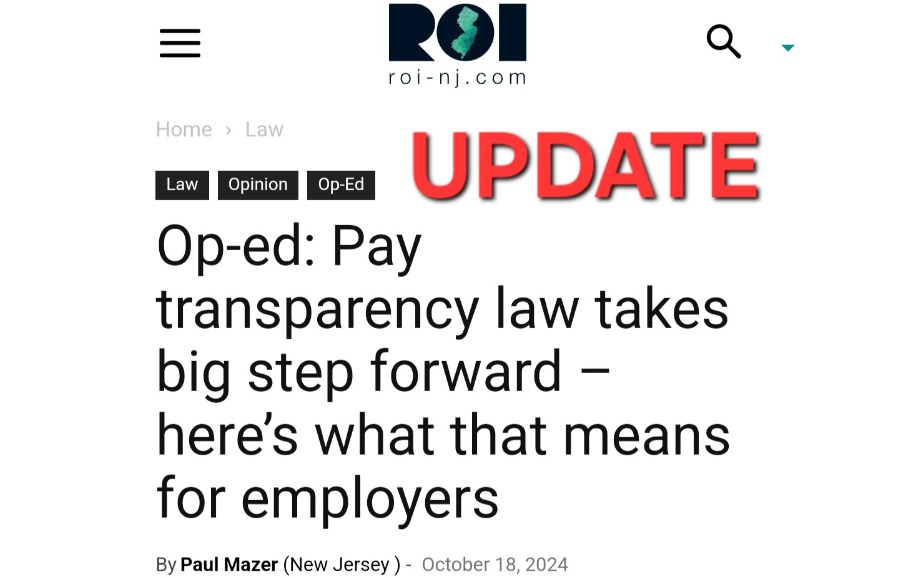UPDATE - New Jersey Employers Need To Start Preparing For The New Pay Transparency Law's June 1, 2025 Effective Date
December 18, 2024 | By: Paul H. Mazer, Esq.
On November 18, 2024, New Jersey Governor Phil Murphy signed into law, Senate Bill 2310, making it the eleventh state to enact a pay transparency law. On June 1, 2025, when the new law goes into effect, certain New Jersey employers will be required to disclose their hourly wage or annual salary pay ranges and general benefit information for each job posting/advertisement. The new law will also require employers to make “reasonable efforts” to advise current employees of promotional opportunities within their organization.
On June 1, 2025, New Jersey will join California, Colorado, Hawaii, New York, Washington State, Maryland, Washington, D.C. and several cities that already mandate salary and wage range information in their job opening postings. Similar mandates are scheduled to become law and take effect within the year in Illinois, Massachusetts, Minnesota and Vermont.
Broad Definition Of A Covered Employer
The pay transparency law defines covered employers broadly as “any person, company, corporation, firm, labor organization, or association with 10 or more employees over 20 calendar weeks and does business, employs persons or takes applications for employment within the State.” The new obligation also applies to the State, county and municipal entity employers. It is important to note that the law does not require that any of the 10 employees, constituting the minimum for the statute’s applicability, must actually work in New Jersey. Additionally, the vague language of the law does not require that if an employer “takes applications for employment within the State,” the applications must be for a New Jersey-based position. Due to the statute’s ambiguous language, it is arguable that the requirement may also apply to any New York, Pennsylvania or Delaware-based positions, or remote positions, if the applications are collected within the State of New Jersey.
The new law does not apply to job postings by temporary service and/or consulting firms (registered with the Division of Consumer Affairs) that are used to identify qualified applicants for potential future job openings, e.g., positions that do not yet exist at the time of the job posting. However, once there is a specific job opening for which they are recruiting, the temporary service or consulting firm must provide the pay and benefit information during “the time of interview or hire.”
Requirements For Postings About New Jobs and Transfer Opportunities
The pay transparently law requires that for each (internal and external) posting for a new job or a transfer opportunity, a covered employer must disclose the hourly wage, annual salary, or range of the hourly wage or annual salary, as well as a general description of benefits and other compensation for which a candidate for the open position would be eligible. However, the statute provides a covered employer with a degree of flexibility by allowing it to increase the wages, benefits, and/or other compensation listed in the posting at the time it extends an offer to a candidate.
“Reasonable Efforts” To Announce Promotional Opportunities
A covered employer is required to make “reasonable efforts” to announce, post, or otherwise inform current employees in an affected department or departments of the employer’s business, of promotional opportunities (whether advertised internally or externally) prior to making a promotion decision. Pursuant to the statute, a “promotion” requires both a change in job title and an increase in compensation.
The new law creates exceptions to the notice requirement for the promotion of a current employee based on years of experience or performance, as well as a promotion on an emergent basis due to an unforeseen event.
Penalties
The statute explains that each new or transfer opportunity where an employer does not include in the job position, the wage/salary range information, general description of eligible benefits and/or other potential compensation, will constitute a single violation of the new law, regardless of the number of listings or forums that advertise the individual open position/transfer opportunity. Similarly, each time that an employer fails to announce, post or otherwise make known one opportunity for promotion (not otherwise excluded from the statute’s applicability as noted above) will be considered a violation of the new law regardless of whether the single promotional opportunity is posted in multiple forums.
An employer that does not comply with the statute’s requirements is subject to a civil penalty of up to $300 for the first violation and $600 for each subsequent violation.
The Commissioner of the Department of Labor and Workforce Development is empowered with the authority to enforce the new requirements and pursue the listed corresponding penalties. This means that applicants and employees do not have a private right of action to enforce the new statute’s provisions against employers.
The Pay Transparency Statute’s Relationship To Other Municipal Transparency Laws
The pay transparency statute does not supersede, nor does it replace more onerous municipal pay transparency laws like Jersey City’s Ordinance 22-045. In Jersey City, an entity with five or more employees (inclusive of independent contractors), is required to include in advertisements or notices for any new positions, transfer or promotional opportunity, the minimum and maximum wage/salary range that the employer, in good faith, believes that it would pay for the advertised job, transfer or promotional opportunity.
The penalty for non-compliance with the Jersey City Law is a fine of up to $2,000.
Bottom Line – New Jersey Employers Should Start Preparing Now!
With the pay transparency law’s June 1, 2025, effective date fast approaching, employers with operations in New Jersey should immediately inform their recruiting and Human Resources teams of the new requirements and take into consideration:
- Hourly and salary ranges for each position.
- Pay equity requirements under applicable State and Federal laws, including New Jersey’s Diane B. Allen Equal Pay Act and its Federal counterpart, the Equal Pay Act.
- Compliance by the employer’s agents, such as - external service providers, temporary placement firms.
- Compliance with any other applicable pay transparency laws, e.g., any of the other ten states with similar requirements or Jersey City’s Pay Transparency law, which imposes additional restrictions and more significant penalties than the new state law.
In light of the significant new obligations that the New Jersey pay transparency law will impose on New Jersey employers, they need to start preparing for the statute’s June 1, 2025, effective date. For questions or assistance in helping your organization comply with New Jersey’s pay transparency law, please contact Paul H. Mazer, Esq., a Partner in the firm's Employment Law Practice Group via email here.
Tags: State of New Jersey • Pay Transparency Law • Equal Pay Act • Labor Law • Human Resources Counseling & Compliance • New Jersey Employers • Governor Phil Murphy • Jersey City • Genova Burns LLC • Paul H. Mazer • Wage & Hour • Employment Law & Litigation • ROI-NJ


